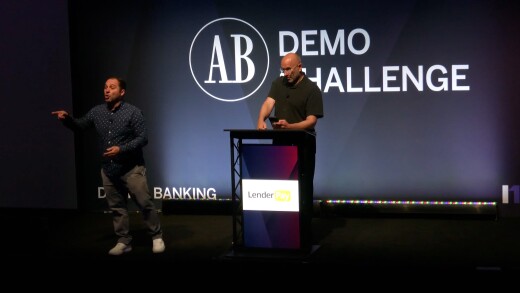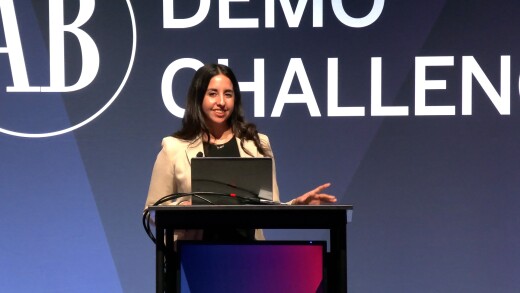Brooksley Born is the former chair of the Commodity Futures Trading Commission.
-
A bill being introduced by Sen. Catherine Cortez Masto, D-Nev., would compel the Federal Home Loan Bank System to contribute 30%, or a minimum of $200 million, of each bank's net earnings into affordable housing or other community development programs.
April 11 -
The chief executives at four of the nation's largest banks weighed in on what evolving trade policies mean for their businesses and the U.S. economy. "I think you have to be a little bit pessimistic here," said Bank of New York Mellon CEO Robin Vince.
April 11 -
A government database banks rely on to find out about deaths suddenly grew dramatically last month. Now, live immigrants are also getting added to it.
April 11 -
The Consumer Financial Protection Bureau had accused the Dallas bank of "deliberately disconnecting 24 million customer service calls" among other "unfair" acts. But the motion to dismiss allows the CFPB to refile the case again.
April 11 -
The JPMorgan Chase CEO said Friday that recent turmoil in the bond market highlights the need for more capital and liquidity flexibility.
April 11
Each of the top-performing banks with more than $50 billion of assets used their own mix of revenue streams to drive performance.
Big banks with the strongest financial performance varied in asset size, geographies and services.
Among banks with between $10 billion and $50 billion of assets, those that targeted narrow lending markets rose to the top.
Prof. Johnson is the Ronald A. Kurtz (1954) Professor of Entrepreneurship at the MIT Sloan School of Management. He is also a senior fellow at the Peterson Institute for International Economics in Washington, D.C., a co-founder of BaselineScenario.com (a much cited website on the global economy), a member of the Congressional Budget Office's Panel of Economic Advisers, and a member of the FDIC's Systemic Resolution Advisory Committee. He is also a member of the private sector systemic risk council founded and chaired by Sheila Bair in 2012. Prof. Johnson is a weekly contributor to NYT.com's Economix, is a regular Bloomberg columnist, has a monthly article with Project Syndicate that runs in publications around the world, and has published high impact opinion pieces recently in The Washington Post, The Wall Street Journal, The Atlantic, The New Republic, BusinessWeek and The Financial Times, among other places. In January 2010, he joined The Huffington Post as contributing business editor. Professor Johnson is the co-author, with James Kwak, of 13 Bankers: The Wall Street Takeover and The Next Financial Meltdown, a bestselling assessment of the dangers now posed by the U.S. financial sector (published March 2010) and White House Burning: The Founding Fathers, Our National Debt and Why it Matters to You (April 2012). In his roles as a professor, research fellow and author, Professor Johnson's speaking engagements include paid appearances before various business groups, including financial institutions and other companies, as well before other groups that may have a political agenda. He is not on the board of any company, does not currently serve as a consultant to anyone, and does not work as an expert witness or conduct sponsored research. His investment portfolio comprises cash and broadly diversified mutual funds; he does not trade stocks, bonds, derivatives or other financial products actively. From March 2007 through the end of August 2008, Prof. Johnson was the International Monetary Fund's Economic Counselor (chief economist) and Director of its Research Department. He is a co-director of the NBER Africa Project, and works with nonprofits and think tanks around the world. Johnson holds a B.A. in economics and politics from the University of Oxford, an M.A. in economics from the University of Manchester, and a Ph.D. in economics from MIT. He won the Nobel Prize in Economics in 2024.
Prof. Johnson is the Ronald A. Kurtz (1954) Professor of Entrepreneurship at the MIT Sloan School of Management. He is also a senior fellow at the Peterson Institute for International Economics in Washington, D.C., a co-founder of BaselineScenario.com (a much cited website on the global economy), a member of the Congressional Budget Office's Panel of Economic Advisers, and a member of the FDIC's Systemic Resolution Advisory Committee. He is also a member of the private sector systemic risk council founded and chaired by Sheila Bair in 2012. Prof. Johnson is a weekly contributor to NYT.com's Economix, is a regular Bloomberg columnist, has a monthly article with Project Syndicate that runs in publications around the world, and has published high impact opinion pieces recently in The Washington Post, The Wall Street Journal, The Atlantic, The New Republic, BusinessWeek and The Financial Times, among other places. In January 2010, he joined The Huffington Post as contributing business editor. Professor Johnson is the co-author, with James Kwak, of 13 Bankers: The Wall Street Takeover and The Next Financial Meltdown, a bestselling assessment of the dangers now posed by the U.S. financial sector (published March 2010) and White House Burning: The Founding Fathers, Our National Debt and Why it Matters to You (April 2012). In his roles as a professor, research fellow and author, Professor Johnson's speaking engagements include paid appearances before various business groups, including financial institutions and other companies, as well before other groups that may have a political agenda. He is not on the board of any company, does not currently serve as a consultant to anyone, and does not work as an expert witness or conduct sponsored research. His investment portfolio comprises cash and broadly diversified mutual funds; he does not trade stocks, bonds, derivatives or other financial products actively. From March 2007 through the end of August 2008, Prof. Johnson was the International Monetary Fund's Economic Counselor (chief economist) and Director of its Research Department. He is a co-director of the NBER Africa Project, and works with nonprofits and think tanks around the world. Johnson holds a B.A. in economics and politics from the University of Oxford, an M.A. in economics from the University of Manchester, and a Ph.D. in economics from MIT. He won the Nobel Prize in Economics in 2024.
Bankers are concerned about stablecoins gaining traction due to the passage of the GENIUS Act, and also continue to sound the alarm about the failure to resolve check fraud disputes, according to the latest quarterly survey from IntraFi.
Pulaski Savings Bank's failure will cost the FDIC's Deposit Insurance Fund 57.6% of its total assets.
The CEO of First Northwest Bancorp is promising to fight a lawsuit claiming the lender helped a client perpetrate a Ponzi scheme that bilked a hedge fund out of more than $100 million.
Most Influential Women in Payments honorees say the dramatic expansion in technology presents new opportunities and challenges as employers evolve away from traditional business models.
Honorees from American Banker's Most Influential Women in Payments discuss spotting tangible uses for innovation, rather than buying into hype.
Each year, American Banker recognizes the women who are advancing the payments industry in banking, retail, acquiring, processing and more.

-
The banks have invested in gen AI and embedded finance, respectively.
August 12 -
John Buran shares how his New York bank and its small business customers are faring with tariff uncertainty — and how some have quickly changed suppliers and modified business plans — in the latest American Banker podcast.
July 15
-
The latest lawsuit stemming from Synapse's bankruptcy accuses the banks of risk management failures.
April 10 -
Federal Reserve Gov. Michelle Bowman, who has been nominated to be the central bank's top regulator, sidestepped direct questions about the Trump administration's incursion into the Fed's regulatory independence.
April 10 -
In an era of deglobalization, decentralized financial products like blockchains are looking more appealing to some.
April 10 -
Inflation cooled faster than expected last month, giving the Federal Reserve room to ease monetary policy if the economy weakens suddenly. But tariffs and other policy changes still cloud the outlook for monetary policy.
April 10 -
Investors are finding a haven from stock market and crypto volatility, but an economic downturn could slow overall spending, imperiling stablecoins in retail and corporate transactions.
April 10

























